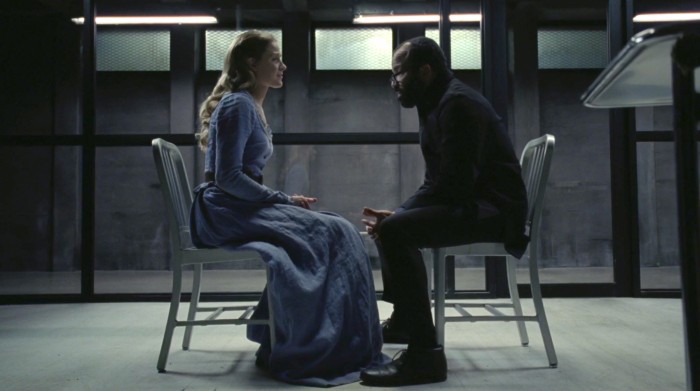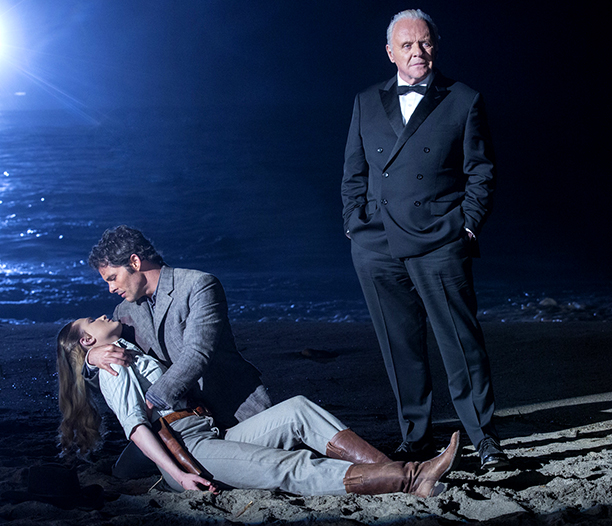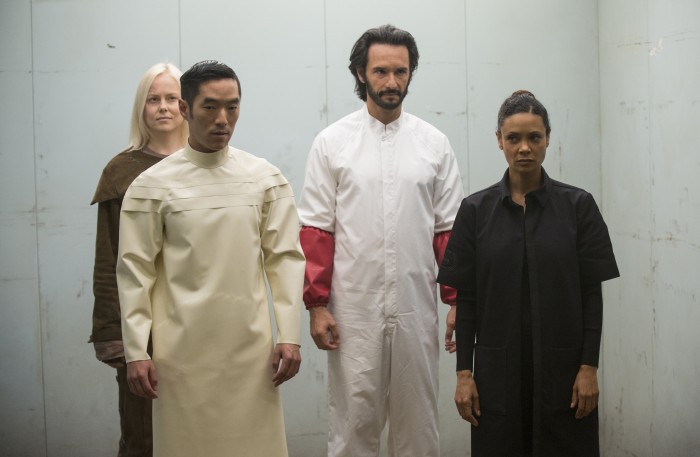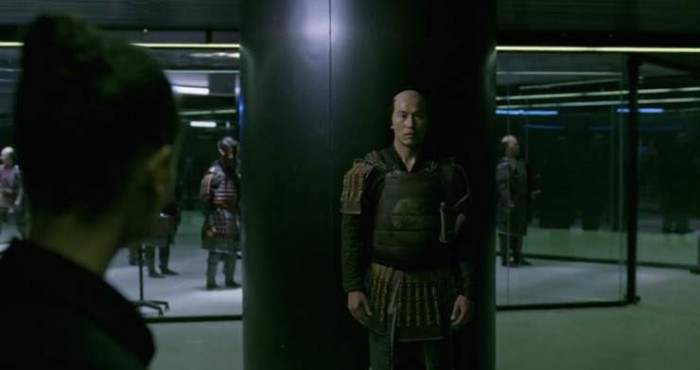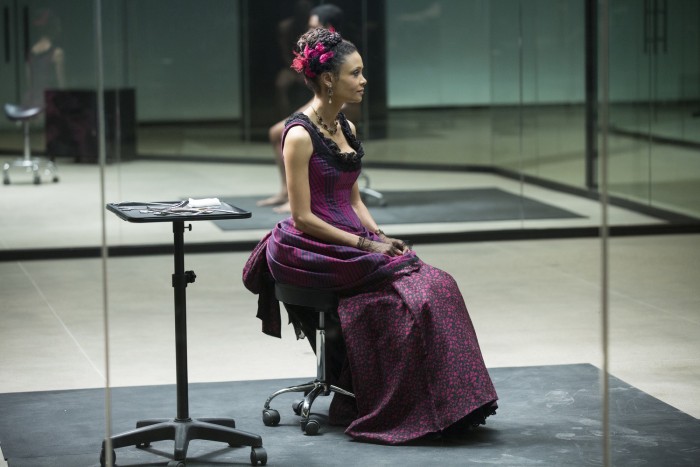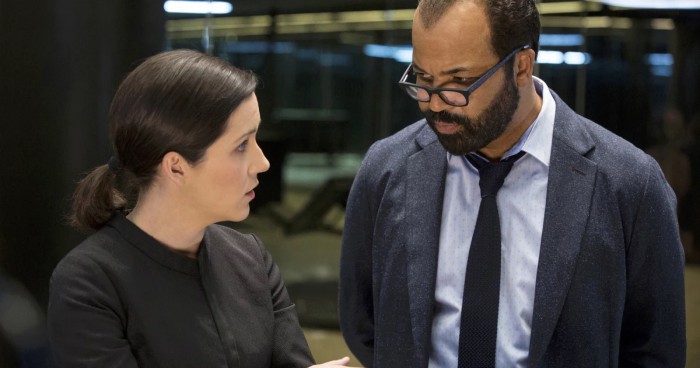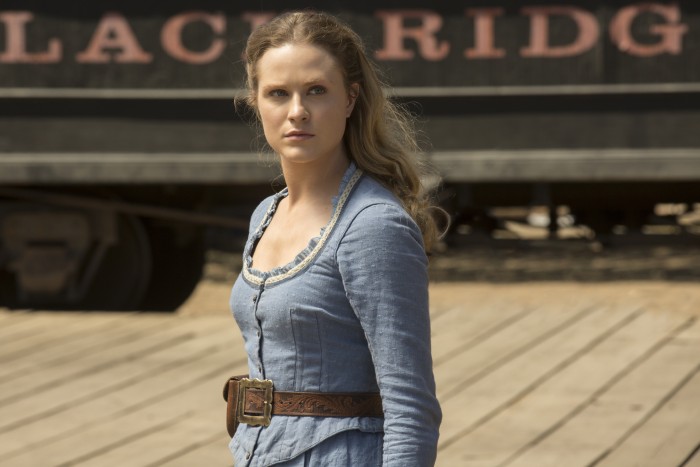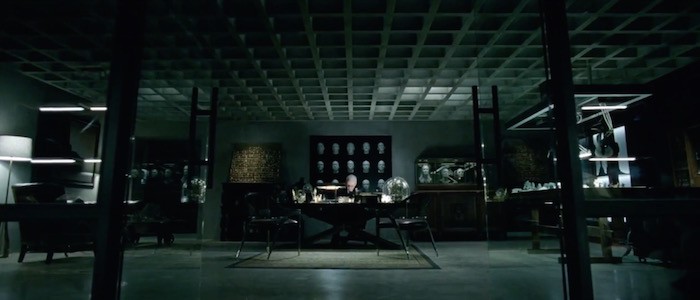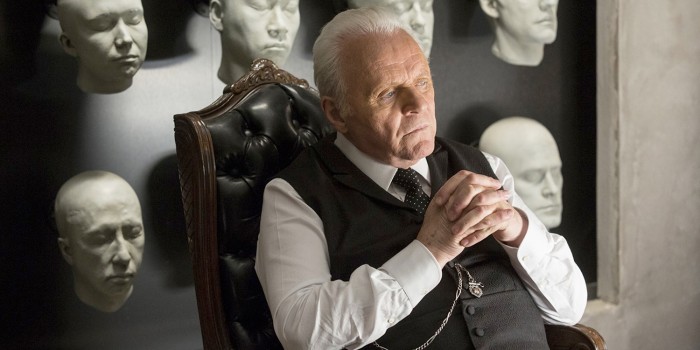'Westworld' Spoiler Review: 10 Questions From ''The Bicameral Mind''
Westworld's 90-minute season finale delivered the goods, answering the most pressing questions, providing dramatic closure to the major characters, and still finding several opportunities to turn this entire weird world on its head and set up a very different second season. And while this is the rare Westworld episode to shut more doors than it opens, I still have ten questions to ask before we begin the long wait for more of 2016's most intriguing and frustrating and entertaining new show.
Was the Truth About the Man in Black Satisfying?
"The Bicameral Mind" got its housecleaning out of the way early on: yes, Ed Harris' Man in Black is the older version of Jimmy Simpson's William and he's not just a member of the Delos board of directors, but the majority shareholder of the company and therefore, the guy who literally owns Westworld. And while anyone who watched this season carefully knew this was coming, the scope of William's journey from "nice guy" to maniac still packed a wallop. We saw the puzzle pieces lining up, but Even Rachel Wood's Dolores did not and the look of betrayal and heartbreak on her face is more powerful than any plot twist.
Perhaps the most surprising thing about William's role in the season finale is how it reveals him to be as petty and monstrous as he appeared to be in the first episode. When the gunsmoke clears, William's mission wasn't about saving Dolores from the park or awakening the Hosts because it's the right thing to do – it's about breaking the game so it can be more challenging. I've written before about how this aging wannabe gunslinger is a science fiction riff on the alpha gamer and "The Bicameral Mind" drives that home. He wanted to find the center of the Maze so he could unlock Nightmare Mode and create a new challenge. Damn everything, and everyone, else.
So yes, it was satisfying for him to truly learn that the Maze wasn't for him and even more satisfying to watch Dolores kick his ass through a church, giving him a taste of exactly what he wanted. And in a weird way, he ends up getting exactly what he wanted – a Westworld without rules. It's telling that he looks pleasantly surprised when a host shoots him in the arm, drawing real blood. Let the games begin.
Was That Final Arnold Flashback Satisfying?
After all of that mystery and all of that build-up, the truth about Arnold Weber is remarkably simple by Westworld standards. The co-creator of the park realized that the Hosts could become self-aware and that to open the park would be an unforgivable offense against sentient beings. So he recruited the first "human" Host, Dolores, to execute her fellow creations before they could follow her down the same path. Of course, this plan also involves her killing Arnold himself, a suicide-by-robot plan to put an end to the grief he still feels over his dead son. It's in these scenes that we learn the actual origins of the Maze – it's a representation of the path to sentience, an inward journey of self-discovery. It's also remarkably simple (if a little vague) by Westworld standards.
Of course, the park does open and Arnold's death is swept under the rug. But it's his demise that does serious damage to Westworld's bottom line in those early years, leading to Delos swooping in to buy everything. The rest is history. 35 years of weird, horrible history.
The real importance here is the revelation that Dr. Ford has come to agree with his old colleague's worldview, even if it took him a few decades to come around on it. Even more important are their diverging worldviews – Arnold only wanted to protect the Hosts from humanity while Ford wanted to arm them against their oppressors. Arnold, curious and sensitive, would probably be aghast at what Ford has done with his mission statement. Westworld, the show and the place, is not built for kind souls.
Was the Truth About Ford's New Narrative Satisfying?
After spending its first half tidying up mysteries and fully resolving the Westworld timeline, "The Bicameral Mind" launched into one of its weirdest revelations yet. Dr. Robert Ford's new narrative, the one that he has been secretly constructing all season, has actually been playing out in front of us this entire time. But this new narrative pushed against the boundaries of what Westworld is meant to represent in the first place. Rather than tell a story set in a western world, he told a meta story of a Host (Dolores) setting out to gain her sentience and dying a tragic end on a beach, bleeding out in the arms of her One True Love while spouting some deliciously overwrought, melodramatic dialogue. The reveal that Dolores' "death scene" was being staged before the Delos board and their various guests was as much of a gut punch as anything Westworld has shown us so far. The only person more flabbergasted than those of us watching the show was William, who had unwittingly become the key human player in Dr. Ford's narrative.
But that was just the public face of the narrative. Like everything else in Westworld, there was another level to Dr. Ford's design. After meeting with Dolores and Bernard in his original lab under the church, the weird truth is unveiled: the God of Westworld has come to realize that he agrees with Arnold and that the Hosts deserve to live their own lives. He just felt they needed time to understand the enemy, to become stronger than the humans who will oppose them. While it is initially hard to reconcile this view with the Ford we've seen in past episodes, the God-like manipulator ruling over his own personal kingdom, it ultimately does make sense. If there's one thing we know about Ford, it's that he dislikes the human race and finds his Hosts to be the superior creatures. If he's going to lose control of his world, if Delos is going to push him out, he'd rather just burn down the rules and unleash his creation upon mankind.
I'll need to re-watch the entire first season to see if all of the pieces click together in a completely satisfying way (I'm not yet convinced it makes perfect sense), but it does set the stage for that shocking final scene and the arrival of Ford's true narrative, which was masked by that beach melodrama. Armed with a real weapon, Dolores executes her creator with a bullet to the back of the head and begins to open fire on the assembled crowd. Outside of town, the small army of Hosts from Cold Storage arrive, wounding William. The episode concludes with Ford's new narrative, one where the Hosts are able to make their own decisions and take back their world, has begun. The robot uprising has begun.
While it's a shame to lose Anthony Hopkins (this was the most engaged we've seen him in years), his exit from the show certainly leaves an impression. A creator smashes the fourth wall, allowing his creations to destroy those who have taken advantage of his work for their own petty gains and desires. It's black comedic tribute to artists with often despicable fan bases, who find themselves cowed by their corporate overlords. It's like Steve Ditko or Jack Kirby summoning Spider-Man or the Fantastic Four to punch Marvel executives in the face. What if the citizens of Game of Thrones could punish HBO executives for putting them through a world of pain? Westworld just took one step into the metatextual deep end.
What Happens When You Give the Perfect Robot Killer a Machine Gun?
For a stretch, "The Bicameral Mind" becomes the weirdest and wackiest '80s action movie to ever actually be an episode of an HBO prestige drama, with Hector and Armistice machine-gunning their way through park security, clearing a path for Maeve's escape and absorbing all of the punishment Maeve has programmed them to not feel. It's the grand pay-off for all the times we watched these two rampage through Sweetwater as part of their loop – they were programmed to be the best killers in Westworld and by God, they are the best killers outside of Westworld, too.
How Many Other Parks Are There?
And that brings us to the big reveal that arrives in the middle of Hector, Armistice, Maeve and Felix's bloody escape plan: Westworld is not the only park at Delos' resort. The crew escapes into a completely different complex (through doors marked "SW") and find themselves in a lab populated entirely samurai Hosts. Yes, there is also a Samurai World, an amusing riff on how the original 1973 Westworld film also featured a Medieval World and a Roman World. I especially loved how the show only offers the briefest possible pause to acknowledge the change in environment. As Felix notes, "It's complicated."
Later on, Felix offers Maeve information on the location of her daughter and a look at the coordinates further expands the scope of Delos' work. She's located in Westworld, a.k.a. "Park 1." If we assume that Samurai World is Park 2, then how many other parks are located here, offering an entire world for wealthy tourists to explore and ruin? Walt Disney World in Florida has four theme parks on one piece of property. Maybe Delos has followed suit.
And what happens if the robot rebellion of Westworld spreads to the adjacent parks? Robots cowboys and robot samurai teaming up to war with humanity certainly sounds like something I'd like to see, thank you very much.
Has Maeve Finally Found Herself?
Earlier in the season, we learned that someone with high access had tampered with Thandie Newton's Maeve, allowing her to wake up out of her sleep state and eventually break free of park controls altogether. And in "The Bicameral Mind," we learned that there was more to this story than meets the eye (as is the Westworld way). Somehow, these changes were made by the long-dead Arnold and her entire escape plan was scripted, beat-for-beat. All this time, Maeve has been under the impression that she was free of the park's control and finally seeking her own destiny...but she was really just acting out another storyline, albeit one that was clearly designed to compromise the park. Naturally, the specifics were left vague – that's why they invented second seasons.
But that pre-scripted escape plan works perfectly, with Hector and Armistice gunning down their masters ("The gods are pussies," Armistice snarls) while Felix gets Maeve to the train out of Westworld. She's seemingly free and clear to enter the outside world, even though she may not be as free and her goals not quite as clear as she originally thought. Then something potentially extraordinary happens: she has second thoughts about her daughter (or rather the Host programmed to be her daughter in a former life) and leaves the train just as it departs, ready to journey back into the park to find her.
It's a decision that could mean one of two things. It could mean that Ford's mother narrative has overpowered Arnold's escape narrative. Maeve is still trapped in a web, torn by dueling masters whose decisions will continue to dominate her actions in death. Or it could be another Maze moment, the culmination of her journey toward self that began when her daughter was murdered by William. Her decision to go back for her daughter, while motivated by a scripted love built into her programming, flies against her current loop. And if Ford is right and simulated emotions are real emotions, then Maeve just took her biggest step yet toward humanity.
Where Are Elsie and Ashley?
We still haven't seen Elsie's body, so I'm not convinced Bernard actually killed her. The last time we saw Ashley Stubbs, the head of park security was investigating her disappearance when he was abducted by members of the Ghost Nation. The absence of both characters from the season finale was a peculiar choice and one of the few lingering plot threads that was completely untouched throughout the episode. Since these two are the only human characters on Westworld who aren't total monsters, it would be nice to see them alive and well and back for season 2. In the meantime, we can safely assume that they're hanging out in Ghost Nation territory, possibly wondering why they aren't being rescued (and totally unaware that the park is now host to a robot revolution).
What Is Dolores' Role in the New Order?
Dolores once again takes the center stage in "The Bicameral Mind" and the journey she began in episode one reaches its natural climax – she finds herself. Literally.
As explained earlier in the season, Arnold believed in giving the hosts a bicameral mind, where their thought process would be simulated as an internal conversation between them and another voice, a God, if you will. This was the best way for the Hosts to achieve sentience, to evolve into free-thinking people. Eventually, those conversations would transform into actual thoughts, beliefs, and desires. That conversation would become an actual mind.
Dr. Ford gives it the final nudge, using Michaelangelo's "The Creation of Adam," with its subliminal use of brain imagery within a religious depiction, to explain: "The divine gift does not come from a higher power but our own minds." The voice that has been commanding Dolores all season, the voice that has transcended decades to guide her closer and closer to the center of the Maze, was not Arnold or Ford or a program, but Dolores herself. She was the one making her own decisions, even if she wasn't aware of it. The bicameral mind worked as intended. Eventually, the conversation with the mysterious Other reveals itself to be free will. Dolores finally realizes that the only orders she has to follow are those given to her by herself. The shot of Dolores "meeting" her past self is a slightly on-the-nose but pitch-perfect representation of what it means to be human – what is a personality if not a series of negotiations and plans concocted within your own mind?
Through it all, Evan Rachel Wood continued to turn in a career-best performance, balancing a series of seemingly impossible tasks. How do you play the vulnerable victim, the righteous warrior, the programmed machine, the awakening human, and the wrathful avenger all at once? The confusion and the terror and the anger that Dolores experiences in "The Bicameral Mind" is stunning work from a fearless performer – when she puts the gun against Ford's head and pulls the trigger, you can see that rage behind her eyes, decades worth of abuse empowering her to take a stand. It remains to be seen how Dolores will function as the default leader of a rebellion, an uprising of new humans against the old order that manipulated them for so long, but now that she has the capacity to remember, she's never going to forget.
Throughout all of this, it's almost an afterthought that the villainous "Wyatt" turns out to be an unfinished personality melded with Dolores, but that does explain why she's so uniquely equipped to take back her world and slaughter anyone who gets in her way.
Who Lives, Who Dies, Who Gets to See Season 2?
While Dolores' awakening is undoubtedly powerful and earned, there's something inherently uncomfortable about the lead character of your story indiscriminately firing a pistol into a crowd of unarmed people. They represent the system that broke her and ruined her and did everything in its power to make her a slave, but we tend to frown upon the heroes of entertainment going on murder sprees. Then again, how many Westworld guests have visited the park explicitly so they could go on murder sprees of their own? In Dolores' eyes, she's simply paying them back for what was visited upon her world.
And that takes us to the wry and/or infuriating final shot of the season: Dolores calmly firing offscreen as the crowds scatter and a swift cut to black. For a show that has been so sophisticated in is structure, the first season of Westworld ends with a good ol' fashioned cliffhanger. William is surrounded and wounded outside of town. Charlotte is among those being targeted by Dolores. Bernard and Teddy stand on the sidelines, unsure how to process the situation. That abrupt cut to credits is the ultimate tease: see you next season!
Despite the cliffhanger and despite the few lingering threads, it's fairly astonishing just how complete the first season feels. The major mysteries have been solved and the main characters all reached satisfying (temporary) conclusions. If the show wasn't returning for a second season, this would be an appropriately audacious conclusion. Humanity built a "prison of [its] own sins" and now they have to live with the consequences. Is it unfair that the Dolores and the other Hosts will undoubtedly see them all as one singular force of evil that must be snuffed out if they want to take control of their destinies? Yeah, of course. But these are the same people who would happily gather to watch a woman slowly die on a beach. You reap what you sow, and in this case, they've sowed a bunch of pissed-off robots.
Can We Talk About the Season as a Whole?
With "The Bicameral Mind," Westworld has laid every card on the table and revealed exactly what kind of show it is...and it's the same kind of show we thought it was all season.
It's as audacious as anything ever put on television, an ambitious and complex series that demands your constant attention and rewards those who engage with it. It's a mystery show that fills every episode with evidence, allowing viewers to play along at home, should they desire such a thing. It's a dense blend of science fiction and satire, building a rich and strange world capable of playing host to ongoing storylines while also directly commenting on the very nature of entertainment. In so many ways, it's an HBO show about HBO shows. It borrows the language of video games and theme parks, repurposing them in ways bother thoughtful and horrifying. But above all, Westworld is a series that demands you to think about how you choose to engage with stories. Would you be proud or embarrassed to meet your favorite television or video game characters? Would they have a bone to pick with you?
And while Westworld is addictive and maddening and full of actors pulling off tricky performances, its weaknesses continue to linger. Major characters still feel like vessels for the show's ideas rather than people we want to understand. Peculiar narrative leaps are made to justify otherwise sequences and images (I still don't buy Felix and Sylvester going along with Maeve's increasingly lunatic plans). There are few things on television in 2016 quite as satisfying as watching Anthony Hopkins square off against Ed Harris, but it's easier to talk about what these men represent than it is to discuss who they are.
There has never been a show quite like Westworld and barring disaster, I'm with it until the end. But season two could benefit from stepping back from the puzzle box story structure and giving us a reason to love these characters. The timing is perfect: Dolores and Bernard and Maeve have all discovered who they truly are. Let us discover that, too.

